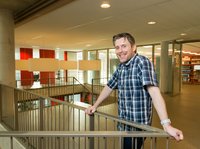Since 1 October CWI has a new group: Evolutionary Intelligence (EI). At the same time, the Life Sciences and Health (LSH) group has ceased to exist. The group leader of EI is Peter Bosman, who was formerly a senior researcher in the LSH group. "Our work will not change drastically", explains Bosman, who is also affiliated with TU Delft as professor of Evolutionary Algorithms. "However, over the years, the focus of the LSH group has shifted. Moreover, LSH applications are increasingly done throughout the institute, so we believe the name is no longer really appropriate."
But what exactly is Evolutionary Intelligence? Bosman explains: "You could describe EI as biologically inspired, self-learning systems that we use to solve complex real-world problems. I’m talking about problems that are hard or impossible to solve optimally with exact algorithms. The algorithms that we study are inspired by natural and biological systems which we know are capable of doing extraordinary things. Key examples are natural evolution and biological brains, the artificial analogy of which are Evolutionary Algorithms (EAs) and Neural Networks (NNs). With EI we focus on novel synergies between these two types of algorithms."

The professor gives an example of an application in medicine: medical image analysis. "We are working on EI that can automatically recognize the prostate on an MRI scan. The system learns this by analyzing multiple scans on which doctors have outlined this organ. This can already be done using existing NNs, but by combining EAs and NNs we can explicitly learn and reproduce a discrete number of variations – not all physicians outline the prostate in the exact same way."
Award-winning work
Besides this application, there are many other examples of applications, such as using Evolutionary Intelligence to automatically design explainable predictive systems that can link certain characteristics of a patient to the outcome of a treatment. In addition, Bosman's group continues his award-winning work in collaboration with Amsterdam UMC and Leiden UMC on applying EI technology to brachytherapy treatment planning, an important type of radiotherapy for the treatment of cancer whereby radioactive sources are placed in or near the tumor.
But his ambition goes far beyond medical applications. "My vision has always been to develop and use EI more widely. This seems to hit home also with a broad range of industry and societal partners, with increasingly interest being expressed to us from a variety of sectors, including healthcare, logistics, agriculture, and industrial design."
Photo: Ivo van der Bent
